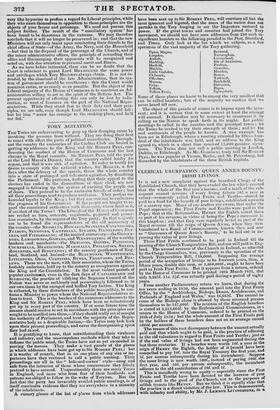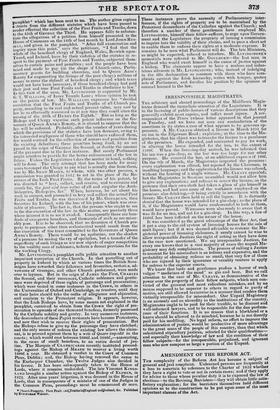CLERICAL USURPATION: QUEEN ANNE'S BOUNTY: IRISH LIVINGS.
Ir is not a new complaint against the beneficed Clergy of the Established Church, that they have evaded the law which enacted that the whole of the first year's income, and a tenth of the sub-
sequent annual revenue of every living (above 501. a year in
value)—commonly called First Fruits and Tenths—should be paid to a fund for the benefit of poor livings, established upwards of a century ago. Many of our readers are aware, that under the Papal supremacy, the First Fruits and Tenths were paid to the Pope; that at the Reformation, HENRY the Eighth seized theta as part of his revenue, in virtue of being the Pope's successor in this kingdom ; and that they were regularly levied as part of the Royal revenue till the reign of Queen ANNE, when they were transferred to a Board of Commissioners, known then and no as "Governors of Queen Anne's Bounty," to be laid out in im- proving the value of poor livings.
These First Fruits continued to be paid in Ireland till the passing of the Church Temporalities Bill, and are still paid in Eng- land. The annual revenue of the Church in Ireland, as admitted by the Clergy themselves, was, previously to the operation of tie Church Temporalities Bill, 730,000/. Supposing the average period of the occupation of livings to be fourteen years, then, :n fifteen years, double this sum, or 1,460,000/., ought to have been paid as Irish First Fruits. But it appears from a return, ordered by the House of Commons to be printed 30th March 1831, thit only 9,9471. hr. 31d. was actually paid during a period of eigh:y years. From another Parliamentary return we learn, that during de ten years ending in 1830, the amount paid into the First Fruits Office, by the "Archbishops, Bishops, Deans, Archdeacons, aid Prebends of England and Wales," was 16,663i. The annual in- come of the Bishops alone is allowed by those reverend person; themselves to be 147,000/. The revenue of the English benefice; is stated at 3,253,662/. by the Ecclesiastical Commissioners, in s return to the House of Commons, ordered to be printed on the 26th of July 1834; but the whole amount of the First Fruits paid by the holders of these benefices does not on an average exced 50001. per annum.
The reason of this vast discrepancy between the amount actually paid and that which ought to be paid, is the practice of adhering to the old valuations in regard to First Fruits and Tenths; just as if the real value of livings had not been augmented during the last three centuries. If a benefice were worth 10/. a year in the reign of HENRY the Eighth, the holder of it [would have been compelled to pay 10/. into the Royal Treasury the first year, and 1L per annum subsequently during his incumbency. Suppose the same living is now worth 500/., instead of paying 500/. the first year, and 50/. per annum subsequently, the incumbent adheres to the old contribution of 10/. and 1/.
This is manifestly wrong in equity—especially since the First Fruits and Tenths have been devoted to the increase of poor livings and to the good of the Church, not to the purposes of selfish tyrants like HENRY. But we think it is equally clear that the practice is a direct violation of the law. This is demonstrated, with industry and ability, by Mr. J. LENNOX LIVINGSTONE, in a pamphlet* which has been sent to Us. The author gives copious e tracts from the different statutes which have been passed to render effectual the collection of the First Fruits and Tenths, down to the 45th of GlitORGL the Third. He appears fully to substan- tiate the allegations of a petition from himself presented to the House of Commons on the 18th of last month by Lord JOHNRus- nu., and given in the pamphlet. "After full examination and inquiry upon this point." says the petitioner, "I find that the whole of the beneficed clergy of England, Wales, Berwick-upon- Tweed, and Ireland, have by their violation of the statutes in re- spect to the payment of First Fruits and Tenths, subjected them- selves to certain pains and penalties ; and the people have been taxed and made to pay (in the shape of Church-rates, Parlia- mentary giants for building churches, and to Queen Anne's Bounty for augmenting the livings of the poor clerg)) millions of money to cover the default of beneficed clergy ; and which taxes would not have been necessary, if those beneficed-clergy had paid their just and true First Fruits and Tenths in obedience to law." In this view of the case, Mr. LIVINGTONE is supported by Mr. G. T. WILLIAMS, of Inner Temple Lane ; whose opinion he took on the points of law. Mr. W twAms expresses his "decided conviction that the First Fruits and Teeths of all Church pro- perty, according to its real and actual present value, may now by law be as effectually recovered as at any time they could since the passing of the 26th of IIENRY the Eighth." But as long as the Bishops and Clergy exercise such potent influence on the Go- vernors of Queen ANNE'S Bounty, it is absurd to suppose that the law will be enforced. Probably, after the number of years during which the provisions of the statutes have lain dormant, owing to the interested negligence of those who should have enforced them, few would contend for the collection of arrears and penalties from the existing defaulters; these penalties being fixed, by an act passed in the reign of GEORGE the Second, at double the amount of the pa) ment due in the first instance. But surely Parliament might interfere to provide for the better enforcement of the law in future. Unless the Legislature takes the matter in hand, nothing will be done. The only attempt that has been made for many years to compel the Clergy to pay what is actually due from them, was by Mr. SHAW MASON, to whom, with two other persons, a commission was granted in 1812 to act in the place of the Re- ceivers of the Irish First Fruits. By the terms of his patent, he was directed to " levy, collect, and receive, and to examine and search for, the just and true value of all and singular the Arch- bishoprics, Bishopiics, &c:' When, however, he set about his work in earnest, and proceeded to levy and collect the actual First Fruits and Tenths, he was threatencd by Mr. GOULBURN, then Secretary for Ireland, with the loss of his patent, which was revo- cable at pleasure. The fact is, that the persons who ought to see to the due execution of the law in this matter, are precisely those whose interest it is to see it evaded. Consequently there are hun- dreds of overgrown benefices, and thousands of such as are miser- ably poor. It is to be observed, that no diversion of Church pro- perty to purposes other than ecclesiastical would result from the due execution of the trust committed to the Governors of Queen ANNE'S Bounty. There would be no spoliation, nor the shadow of a pretence for raising the cry of spoliation, but a transfer of the superfluity of such livings as are now objects of eager competition to the wealthy sons of noblemen, to form a decent provision for the the working Clergy. Mr. LIVINGSTONE'S pamphlet calls public attention to another important usurpation of the Church. In that parcelling out of property in Ireland by which at various times the British Sove- reigns have rewarded their followers and favourites, rectories, ad- vowsons of vicarages, and other Church preferment, were made over to laymen. But in the reign of JAMES the First, CHARLES the Second, and their successors, Catholic noblemen and gentle- -men were deprived of these rights of patronage and presentation; which were vested in some instances in the Crown, in others in the Universities of Oxford and Cambridge, as trustees, until they or their heirs should take the oaths of allegiance and abjuration, and conform to the Protestant religion. It appears, however, that the Irish Bishops have, by some means not explained in the pamphlet, contrived to obtain from the Crown the right of pre- sentation to upwards of one thousand benefices, formerly possessed by the Catholic nobility and gentry. In very numerous instances, the descendants of these Papist recusants have become Protestants, and now they wish to recover their rights of presentation. But the Bishops refuse to give up the patronage they have clutched; and the only means of redress the existing law allows the claim- ant, is to proceed against them by a writ of Quare impedit in the courts ; which would cost between 2000/. and 30001.,—amounting, in the cases of small benefices, to an entire denial of jus- tice. The Marquis of CLANRICARDE recently instituted proceed- ings against the Bishop of MEATH to recover a living worth 1000/. a year. He obtained a verdict in the Court of Common Pleas, Dublin; and, the- Bishop having removed the cause to the Exchequer Chamber, the Twelve Judges also decided in his favour. It has been subsequently taken to the House of Lords, where it remains undecided. The late Viscount KINGS- LAND brought a similar action against the Bishop of ELPHIN, in 1822. After nine year& litigation, it was decreed in the House of Lords, that in consequence of a mistake of one of the Judges in the Common Pleas, proceedings must be commenced de novo.
• Church Property. First Fruit: nd,Teuths inlEuglaud andpreland, &c. Published by Erne a sum Wasox.
These instances prove the necessity of Parliamentary inter- ference, if the rights of property are to be maintained by the Protestant descendants of the Catholics against the Church; and therefore a number of these gentlemen have employed Mr. LIVINGSTONE, himself their fellow-sufferer, to urge upon Govern- ment and the Legislature the propriety of issuing a commission to inquire into the validity of their claims, and to pass a short act to enable them to enforce their rights at a moderate expense. It remains to be seen what Parliament will do. The late Ministers, as might be expected, refused to interfere. Mr. LIVINGSTONE'S memorials were referred to Mr. GOULBURN—the last man in England who would exert himself in the cause of justice against a bishop. The claimants appear to have a zealous and indus- trious advocate in Mr. LIVINGSTONE; who, instead of indulging in the idle declamation so common with those who have com- plaints against the Irish hierarchy, writes with temper, quotes acts of Parliament, and fortifies his position by the opinions of counsel learned in the law.



























 Previous page
Previous page